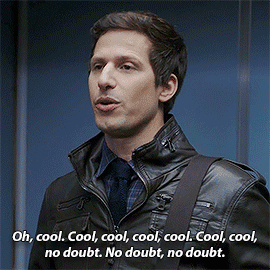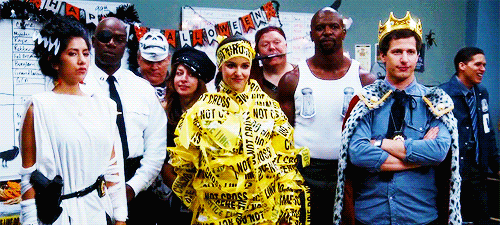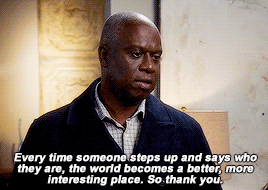Of the sitcoms I have watched, none have matched the kind of humor and depth that Brooklyn Nine-Nine presents in its 22-minute episodes. There’s a lot to unpack about why this is my favorite show at the moment, but I will stick to the most important points, cool?

Mostly taking place in the 99th police precinct of New York and with the same eight characters in almost every episode, you would think the show might get boring or repetitive. After all, it consists mainly of dialogue with little action. Of course, this format is seen in other comedies like Parks and Recreation and The Office, which have historically garnered plenty of positive attention. However, Brooklyn Nine-Nine takes on a new kind of comedy in each of its episodes, some of which focus on real-world issues while others are laid back and fun, like the Halloween episodes.

The show doesn’t rely on stereotypes for its jokes and beautifully handles the fact that it’s about cops in a time where the police are in the spotlight for various abuses of power. While existing in a world of laughter and light-hearted banter, the show also addresses why civilians don’t respect police officers in a case where someone vandalized posters the precinct created to foster better community relations in the third episode of season 3, “Boyle’s Hunch.” It highlights racial profiling in “Moo Moo” (season 4 episode 16) when Terry is stopped by a white police officer while walking down the street in his own neighborhood. The white officer detains Terry until he is able to provide his badge number and prove he is also an officer.
One thing that sets B99 apart from any other sitcom or mockumentary is that the content never makes you cringe when you’re meant to laugh. When watching older sitcoms, you might hear a joke that would be considered incredibly inappropriate today: You don’t know if you’re supposed to laugh or ignore it, so you mostly cringe. We’ve all been there. But Brooklyn Nine-Ninemaintains its relevant and witty jokes without turning toward offensive punchlines. It’s very self-aware in that sense.
When an episode focuses on a sensitive topic, the writing does so in the right ways. A character will address a problematic issue or comment that has been made and serious conversations are not sacrificed for the sake of inserting a joke. Instead, the writers balance funny quips and genuine, heartfelt moments. For example, when Rosa comes out as bisexual and Gina said, “You know, in another lifetime you and I would’ve made a hot ass couple,” it was immediately followed by support from Holt who has been through a similar situation:

Rather than making Rosa’s character all about being a bisexual Latina or Holt’s character all about what it’s like to be a gay black man, those identities are treated as just a part of their character and not their only purpose for existing in the show.
This leads me to another reason why this show is important: The main characters are fleshed out in complete and real ways — even the minorities. Shocking, I know. Each character has a background that explains why they are who they are, and no one is there simply to be able to say, “We’re diverse! Look at our token Black and Latinx people! Come watch!” You can look at Amy, Terry, Rosa and Holt and talk about more than just how hard it is for them to be minorities. You see them actually develop into more complex people from season 1 to the newest season 6.
Other comedy shows tend to be just that — comedy shows. There might be a plot line hidden in there somewhere, but not one that makes you want to be invested in the characters like Brooklyn Nine-Nine. You want to see Jake and Amy end up together (the only truly healthy heterosexual relationship I have ever seen on television, but that’s a conversation for another time), you want to see Holt thrive as captain of the Nine-Nine and you want to see where everyone else ends up. The same episode can make you laugh and tear up within seconds, and if you’re anything like me, you’ll be impatiently waiting for more episodes.